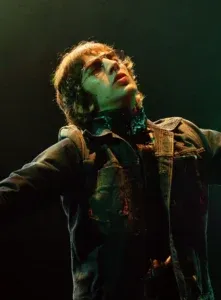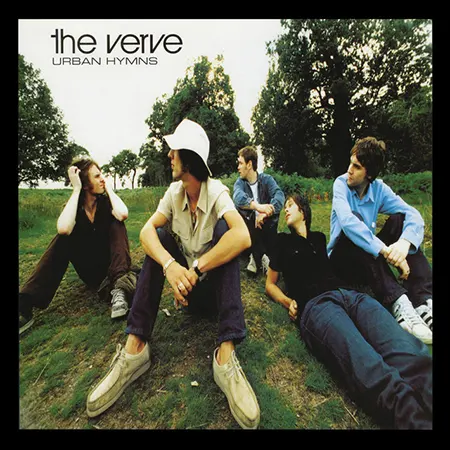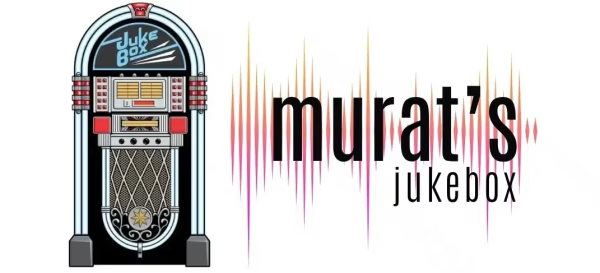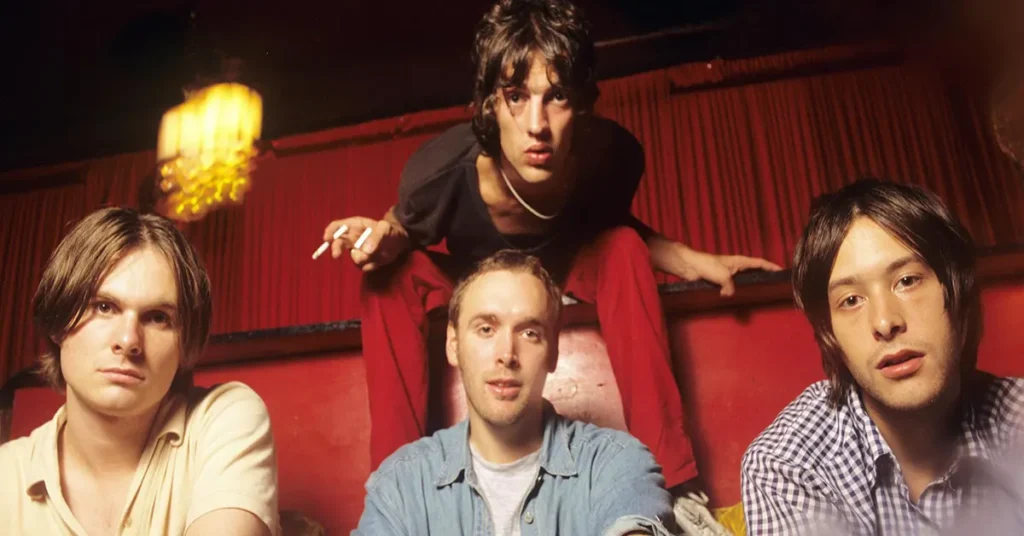The Verve: The Journey of Britpop’s Atmospheric Pioneers
The Verve. Formation and Early Development (1990–1993)
The Verve, an English alternative rock band, was formed in 1990 in Wigan, Greater Manchester. The original lineup consisted of Richard Ashcroft (vocals and primary songwriter), Nick McCabe (lead guitar), Simon Jones (bass), and Peter Salisbury (drums). Initially called simply “Verve,” they later added “The” to avoid confusion with a jazz label.

Emerging during the early 1990s, The Verve started as part of the shoegaze and psychedelic rock scenes, heavily influenced by bands like The Stone Roses, My Bloody Valentine, and The Jesus and Mary Chain. Their early sound was characterized by swirling guitars, atmospheric textures, and introspective lyrics, distinguishing them from the more pop-oriented Britpop bands that would rise later in the decade.
Their debut album, A Storm in Heaven (1993), produced by John Leckie, was a sprawling psychedelic rock record filled with rich, immersive soundscapes and experimental guitar work. Songs like “Slide Away” and “Blue” showcased their ability to blend dreamy melodies with emotional depth. Although it received critical acclaim for its artistry and ambition, the album achieved only modest commercial success, reflecting the band’s underground status at the time.
The Verve. Turbulent Growth and Initial Breakup (1994–1995)
Following A Storm in Heaven, The Verve experienced internal tensions, particularly between Ashcroft and McCabe. The band’s direction and personality conflicts caused instability. Ashcroft briefly left the group, and The Verve disbanded in 1995.
During this period, Richard Ashcroft worked on solo material, while the rest of the band members pursued side projects. Despite the breakup, the seeds for their later mainstream breakthrough were being planted.
The Verve. Reformation and the Pinnacle of Success (1996–1999)
A Northern Soul (1995)
Before their brief split, The Verve recorded A Northern Soul, released in 1995. This album marked a darker and more melancholic turn, blending their psychedelic roots with emotional intensity and introspection. Although critically praised, it still did not achieve significant commercial success.
The Reunion and Urban Hymns (1996–1997)
The Verve reunited with their original lineup in 1996, reenergized and focused on refining their sound for mainstream audiences. They signed with Virgin Records and began working on their third album, Urban Hymns, produced by Youth and Chris Potter.
Released in 1997, Urban Hymns was a monumental success that transformed The Verve from underground cult favorites into international superstars. The album merged alternative rock with Britpop sensibilities and orchestral arrangements, creating lush, emotive soundscapes. It featured some of the most memorable songs of the decade:
- “Bitter Sweet Symphony”: The band’s signature track, built around a haunting orchestral sample from a 1965 version of The Rolling Stones’ song “The Last Time.” Its sweeping strings, combined with Ashcroft’s reflective vocals, made it an anthem for a generation. The song’s video, featuring Ashcroft walking down a London street ignoring distractions, became iconic. Despite its success, the song was mired in legal controversy over the sample rights.
- “The Drugs Don’t Work”: A poignant ballad about loss and addiction, this song showcased Ashcroft’s ability to write deeply personal and emotional lyrics.
- “Lucky Man”: An uplifting and melodic track that balanced hope and vulnerability.
- “Sonnet” and “This Is Music”: Other standout tracks that featured the band’s signature blend of atmospheric guitar textures and heartfelt vocals.
Urban Hymns became one of the best-selling albums of the 1990s in the UK and worldwide, earning multi-platinum certifications and widespread critical acclaim.

Legal Battles and Challenges (1998–1999)
Despite their success, The Verve’s breakthrough was overshadowed by a prolonged legal dispute concerning the orchestral sample in “Bitter Sweet Symphony.” The rights were initially awarded to ABKCO Records, which represented the Rolling Stones’ management. This resulted in The Verve losing all royalties from the single and songwriting credits being attributed to Mick Jagger and Keith Richards.
This legal battle created significant tension within the band and affected their morale. Combined with internal conflicts, The Verve officially disbanded again in 1999, just two years after their peak.
Solo Careers and Side Projects (1999–2006)
After the breakup, Richard Ashcroft launched a successful solo career, releasing several albums such as Alone with Everybody (2000) and Human Conditions (2002). His solo work continued to explore melodic rock and introspective themes.
Other band members pursued various projects: Nick McCabe worked on experimental music and collaborated with other artists, while Peter Salisbury and Simon Jones remained active in the music scene.
Reunion and Later Years (2007–2009)
In 2007, The Verve reunited for a new era, releasing their fourth studio album, Forth (2008). This album retained the band’s atmospheric style but incorporated more rock-oriented elements and a mature sound. Songs like “Love Is Noise” displayed their ability to blend catchy hooks with layered instrumentation.
Forth was well received critically and commercially, though it did not match the unprecedented success of Urban Hymns. The band toured extensively to support the album but officially disbanded again in 2009.
The Verve. Musical Style and Artistic Influence
The Verve’s music is defined by:
- Atmospheric Guitar Work: Nick McCabe’s textured and often reverb-heavy guitar playing creates lush soundscapes that blend psychedelic and shoegaze elements.
- Emotive Vocals: Richard Ashcroft’s soulful, introspective singing carries much of the emotional weight, often exploring themes of hope, despair, addiction, and personal struggle.
- Orchestral Arrangements: The band often incorporated strings and orchestral elements to add depth and drama to their compositions, especially prominent on Urban Hymns.
- Britpop and Alternative Rock Fusion: While part of the Britpop wave, The Verve’s sound was more expansive and experimental than many of their contemporaries, merging indie rock with psychedelic influences.
The Verve. Legacy and Impact
The Verve are widely regarded as one of the most influential British bands of the 1990s. Their ability to combine introspective lyricism with expansive, atmospheric sound helped define a key strand of alternative rock and Britpop.
“Bitter Sweet Symphony” remains one of the most enduring and recognized songs of the era, symbolizing the band’s artistic vision and the tensions between creativity and commercialism.
The resolution of the sample dispute in 2019, when Mick Jagger and Keith Richards returned the rights to Richard Ashcroft, was seen as a long-overdue recognition of The Verve’s artistic contribution.
The band’s influence can be heard in later British indie and alternative acts, and their albums, especially Urban Hymns, continue to receive acclaim for their emotional depth and musical innovation.
Interesting Facts
- The band originally called themselves just “Verve” but added “The” to avoid legal issues with a jazz label called The Verve.
- Nick McCabe is often praised as one of the most underrated guitarists of his generation.
- The music video for “Bitter Sweet Symphony” was famously shot in one continuous take.
- The Verve’s sound evolved significantly from psychedelic and shoegaze roots to a more polished Britpop style.
- The legal battle over “Bitter Sweet Symphony” royalties lasted over a decade until resolved in 2019.





